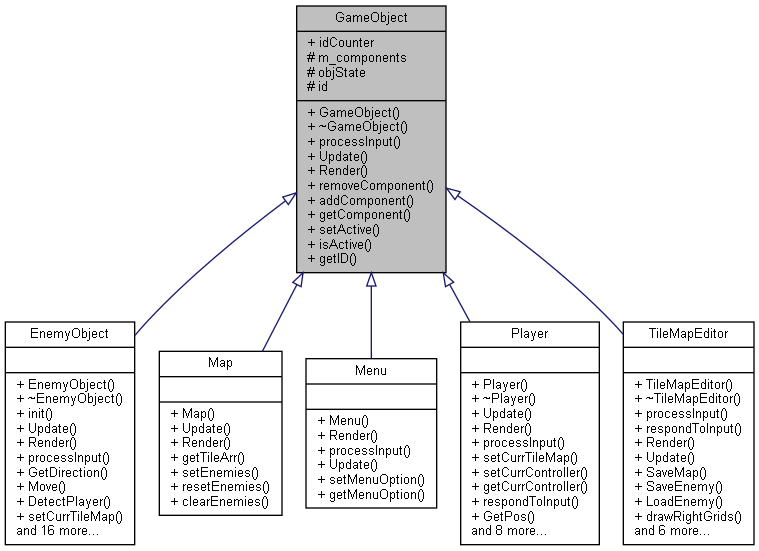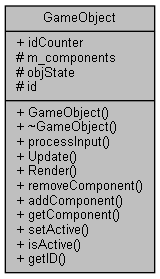Base class for all entities in scenes. More...
#include <GameObject.h>


Public Member Functions | |
| GameObject () | |
| Constructor. More... | |
| ~GameObject () | |
| Destructor. More... | |
| virtual void | processInput (SDL_Event e) |
| Virtual method. Process user input. More... | |
| virtual void | Update (int x, int y, int *params) |
| Update the position of something. More... | |
| virtual void | Render (SDL_Renderer *ren) |
| Render the gameobject to the active viewport. More... | |
| void | removeComponent (std::string key) |
| Remove a component in this gameobject. More... | |
| void | addComponent (std::string key, Component *component) |
| Add a component in this gameobject. More... | |
| Component * | getComponent (std::string key) |
| Get an reference of a component. More... | |
| void | setActive (bool newState) |
| activate / deactivate game object. inactive object won't be updated and rendered More... | |
| bool | isActive () |
| Get the state of the game. More... | |
| int | getID () |
| Get the unique id of the gameobject. More... | |
Static Public Attributes | |
| static int | idCounter = 0 |
Protected Attributes | |
| std::map< std::string, Component * > | m_components |
| Store all the game components in a map. More... | |
| bool | objState |
| deactivated objects won't get updated/rendered More... | |
| int | id |
| the unique id More... | |
Base class for all entities in scenes.
|
inline |
Constructor.
|
inline |
Destructor.
|
inline |
Add a component in this gameobject.
| key | The name of the component. |
| component | The reference of the component. |
|
inline |
Get an reference of a component.
| key | The name of the component. |
|
inline |
Get the unique id of the gameobject.
|
inline |
Get the state of the game.
|
inlinevirtual |
Virtual method. Process user input.
| e | A SDL_Event that contains structures for the different event types. |
Reimplemented in TileMapEditor, Player, Menu, and EnemyObject.
|
inline |
Remove a component in this gameobject.
| key | The name of the component. |
|
inlinevirtual |
Render the gameobject to the active viewport.
| ren | Reference to SDL renderer. |
Reimplemented in TileMapEditor, Player, Menu, Map, and EnemyObject.
|
inline |
activate / deactivate game object. inactive object won't be updated and rendered
|
inlinevirtual |
Update the position of something.
| x | The x location of something. |
| y | The x location of something. |
| params | An int array stores additional data. |
Reimplemented in TileMapEditor, Player, Menu, Map, and EnemyObject.
|
protected |
the unique id
|
static |
|
protected |
Store all the game components in a map.
|
protected |
deactivated objects won't get updated/rendered